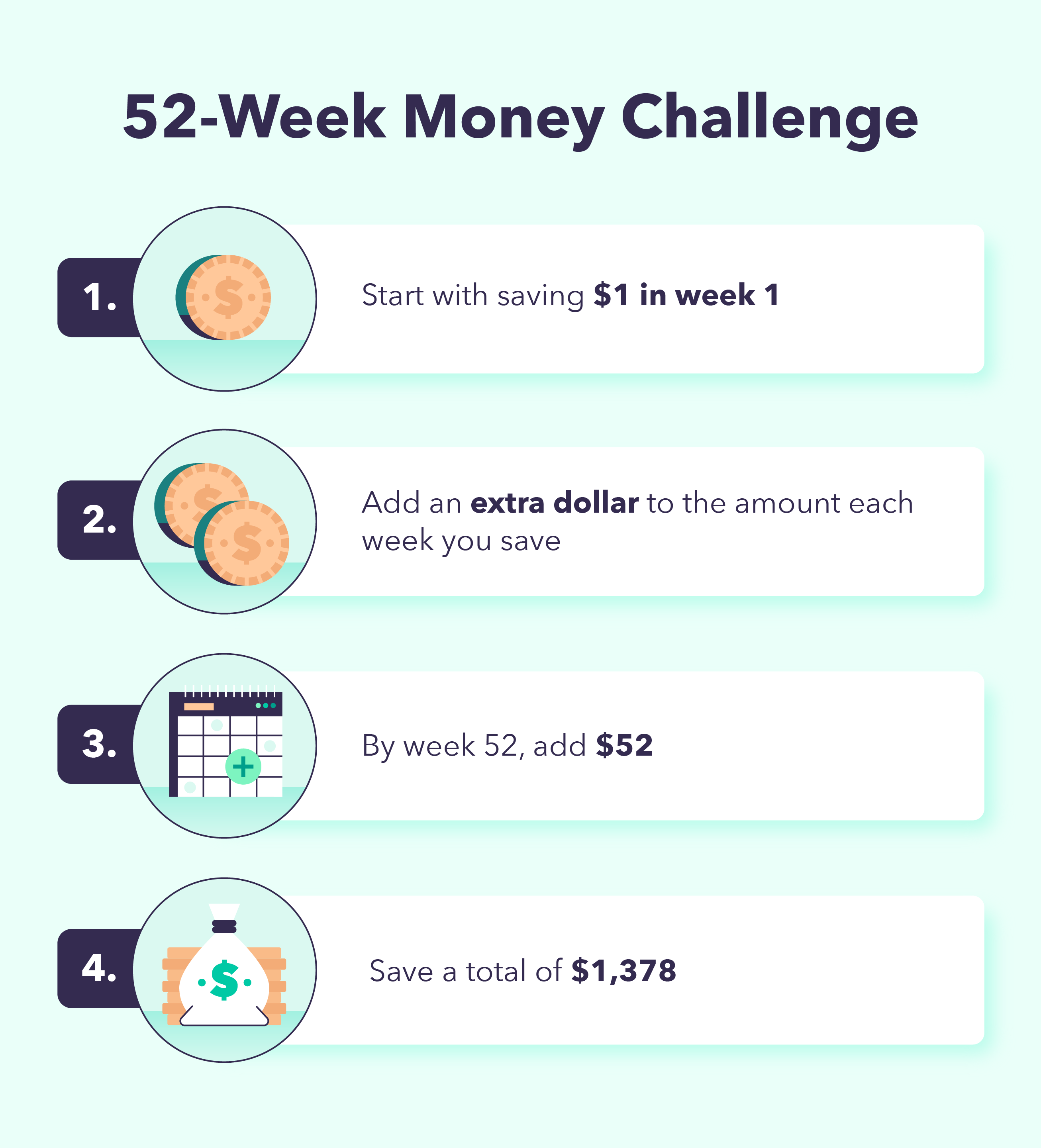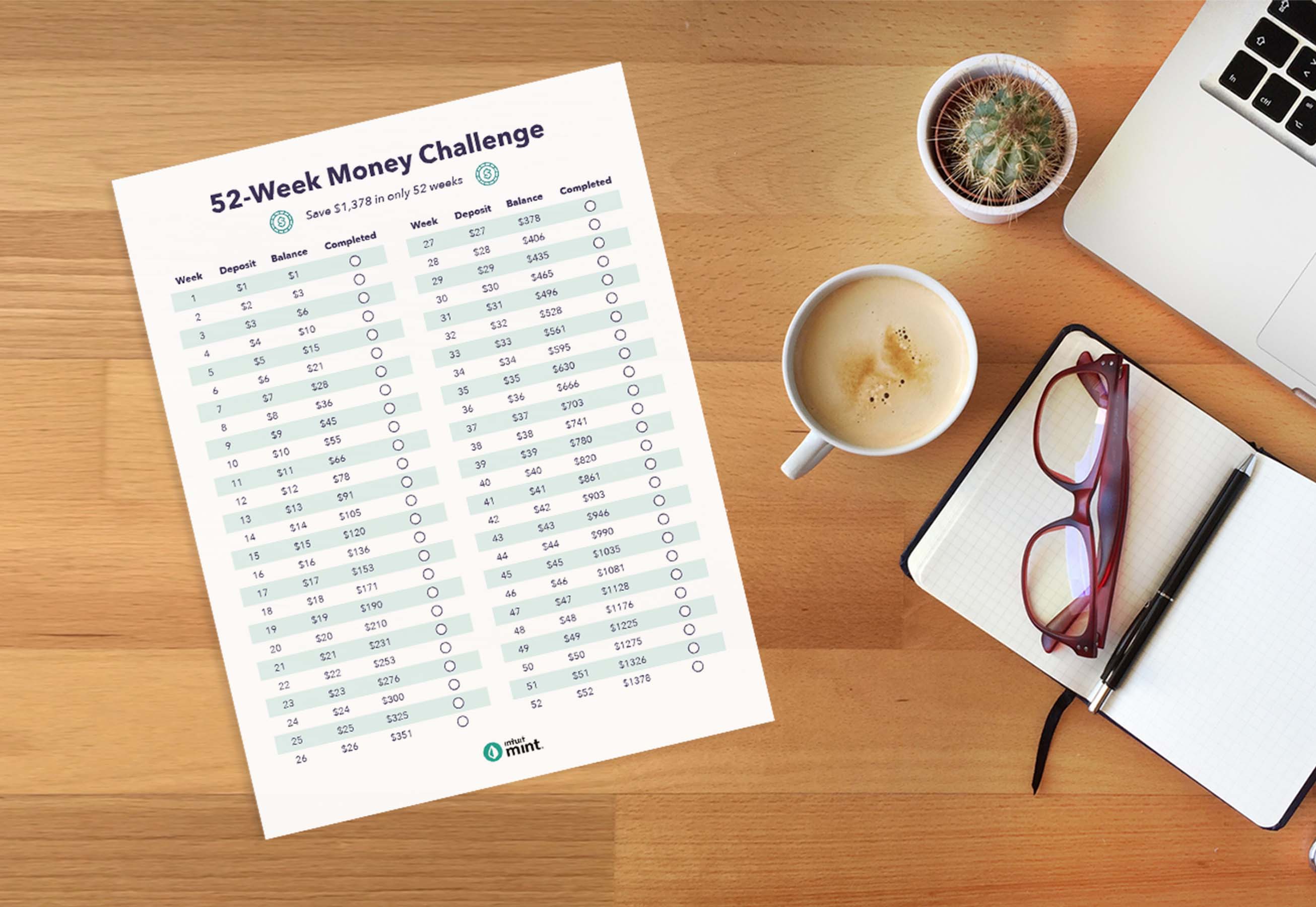How to Save $1,378 in a Year
When it comes to the new year, many people want to start embracing change and developing new habits. In fact, 27 percent of adults in the U.S. made at least one resolution for 2020, and 44 percent of those people had “saving more money” as one of them.
One way to fulfill a New Year’s resolution is to set achievable goals for yourself and keep track of your progress. There are plenty of challenges to pick from if you want to save money during the new year. If you’re up for a challenge that doesn’t require a lot of money and effort each month but still saves you $1,378 at the end of the year, the 52-week money challenge might be just right for you.
What Is the 52-Week Money Challenge?

The 52-week money challenge is a savings challenge in which you deposit an increasing amount of money every week for 52 weeks. At the end of the 52 weeks, you should have at least $1,378 saved up in your bank account. This is a flexible challenge that can be done in a couple of different ways and even allows you to save more if you decide to deposit a larger amount each week.
Most commonly, the dollar amount you save every week corresponds to the week of your challenge. For instance, you set aside $1 during week one, $5 during week five, $39 during week 39, and so forth.
When Is the Best Time to Start the 52-Week Money Challenge?
The great thing about the 52-week savings challenge is that you can essentially start it at any week you’d like. But if you want it to be part of your New Year’s resolution, starting it during the first week of the year will guarantee you at least $1,378 by the last week of the year — if you follow it properly.
How Does the 52-Week Money Challenge Work?
For this challenge, the amount you should deposit is usually the same as the number of the week in the challenge. Here’s how the savings challenge works:
- Starting on week one, deposit $1 to a savings account
- On week two, you should deposit $2
- On week three, deposit $3
- On week four, deposit $4, and so on
- Deposit until week 52, when you will deposit $52
Easy, right? Depositing an increasing amount of money each week makes it an attainable goal to achieve $1,378 at the end of the last week. Each time you make a deposit, write down your current total savings to keep you on track and motivated.
Here is a money-saving chart to help you understand how much money you should be depositing each week during the 52-week money challenge:
| Week | Weekly Deposit | Total Savings |
|---|---|---|
| Week 1 | $1 | $1 |
| Week 2 | $2 | $3 |
| Week 3 | $3 | $6 |
| Week 4 | $4 | $10 |
| Week 5 | $5 | $15 |
| Week 6 | $6 | $21 |
| Week 7 | $7 | $28 |
| Week 8 | $8 | $36 |
| Week 9 | $9 | $45 |
| Week 10 | $10 | $55 |
| Week 11 | $11 | $66 |
| Week 12 | $12 | $78 |
| Week 13 | $13 | $91 |
| Week 14 | $14 | $105 |
| Week 15 | $15 | $120 |
| Week 16 | $16 | $136 |
| Week 17 | $17 | $153 |
| Week 18 | $18 | $171 |
| Week 19 | $19 | $190 |
| Week 20 | $20 | $210 |
| Week 21 | $21 | $231 |
| Week 22 | $22 | $253 |
| Week 23 | $23 | $276 |
| Week 24 | $24 | $300 |
| Week 25 | $25 | $325 |
| Week 26 | $26 | $351 |
| Week 27 | $27 | $378 |
| Week 28 | $28 | $406 |
| Week 29 | $29 | $435 |
| Week 30 | $30 | $465 |
| Week 31 | $31 | $496 |
| Week 32 | $32 | $528 |
| Week 33 | $33 | $561 |
| Week 34 | $34 | $595 |
| Week 35 | $35 | $630 |
| Week 36 | $36 | $666 |
| Week 37 | $37 | $703 |
| Week 38 | $38 | $741 |
| Week 39 | $39 | $780 |
| Week 40 | $40 | $820 |
| Week 41 | $41 | $861 |
| Week 42 | $42 | $903 |
| Week 43 | $43 | $946 |
| Week 44 | $44 | $990 |
| Week 45 | $45 | $1,035 |
| Week 46 | $46 | $1,081 |
| Week 47 | $47 | $1,128 |
| Week 48 | $48 | $1,176 |
| Week 49 | $49 | $1,225 |
| Week 50 | $50 | $1,275 |
| Week 51 | $51 | $1,326 |
| Week 52 | $52 | $1,378 |
How to Adjust the 52-Week Money Challenge for Your Budget
The 52-week challenge can also be adjusted depending on your goals or financial habits. For instance, you can also start from the highest amount, and deposit a decreasing amount of money each week. Or you can choose to deposit the same amount every week.
From Lowest to Highest Amount
The lowest to highest amount method is the traditional 52-week money challenge. You will start with $1 and deposit an increasing amount of money each week until the end of week 52, totaling up to $1,378.
From Highest to Lowest Amount
If you believe you will be spending more toward the end of the year, perhaps due to the holidays, you can flip the 52-week money challenge by depositing your highest amounts first. In this method, you will start with the highest amount, $52 at week one, and deposit a decreasing amount each week. So on week 52, you will deposit $1, still totaling up to $1,378.
Save $26.50 Each Week
If you want to make things even easier, this no-brainer method still totals $1,378 at the end of the year. By using this method, you will deposit the same amount each week: $26.50. You can also set up automatic transfers every week — that way, you don’t have to worry about making different deposits each week.
How to Be Successful in the 52-week money challenge
Starting this challenge should be easy. After all, you’re only starting with a $1 deposit. The struggle many people face with money challenges is keeping up with them. To make sure you’re successful in the 52-week money challenge, follow these tips to stay on track:
Have a Goal in Mind
We all need a little motivation when it comes to achieving resolutions. Start the challenge with an end goal in mind and set reminders for yourself throughout the process. Having a goal such as saving up for a vacation or increasing your emergency fund will help you stay motivated during the challenge.
Add It to Your Budget
To ensure that you’re on track with your challenge each month and have enough money available for it, you can add it to your weekly budget. If you use a budgeting app, add the amount that will be going to your savings account each week.
You can also use our printable of the 52-week money challenge to help you stay on track. You can set a reminder to add money to the challenge each week, or set up an automatic transfer to your savings account.
Cut Back on Expenses
To make sure you’re successful in this challenge, consider cutting back on some expenses you have each week. This also helps with financial knowledge as you start building healthy spending habits.
Take a look at your current budget and evaluate if there are any expenses that are overlooked. Pay extra attention to subscription services you no longer use or whether you’re overspending on food delivery services. This is also an opportunity to sell items you don’t use anymore for extra cash.
Keep Your Savings Challenge Money in a Separate Account
Because this challenge lasts a whole year, it might be tempting to use the challenge funds when buying groceries or having dinner with friends at some point. To prevent that from happening, keep the funds in a separate account, preferably a high-yield savings account.
You can open a savings account strictly for this challenge, or if you feel more motivated by using cash, store it in a safe place. Having the challenge money in a separate account can also help you keep track of it.

Benefits of the 52-Week Savings Challenge
Whether you decide to try it out, skip a couple of weeks, or even end up not finishing it, there are still some benefits and lessons you can take away from the 52-week money challenge:
- Start a habit of saving consistently
- Get motivated to try out other challenges
- Learn more about your financial goals
- Improve your personal finances
- Track your weekly budget
- Save at least $1,378!
If you decide not to complete the challenge, you can use it as a learning opportunity to improve your finances and try another challenge that fits your lifestyle better. However, if you finish the challenge, you will have built up some savings that you can invest or use to start an emergency fund — or you can keep the challenge going for another year to save even more.

